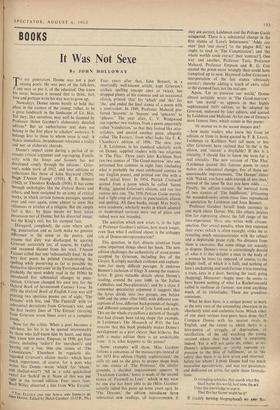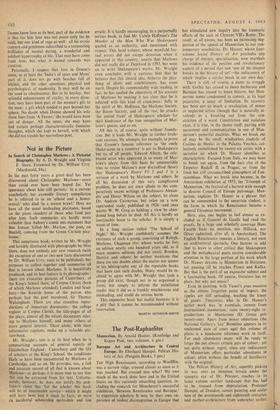BOOKS It Was Not Sexe
By JOHN 1101.1.()WAY rro my generation, Donne was not a poet
I among poets. He was part of the folk-lore, if one may so put it, of the educated. One knew his verse, because it seemed that to think, feel, love and perhaps write his way was to grow up.
Nowadays, Donne seems barely to hold that Place in the cosmos of the young; rather, to be a great landmark in the landscape of Lit. Hist. Yet they, like ourselves, may well be daunted by Professor Helen Gardner's elaborately detailed edition.* But an authoritative text does not belong in the first place to scholars' esoterico. It belongs first to those to whom verse is real: it makes immediate, incandescent relevance a reality and not an elaborate charade.
Donne's impact came during a period of in- cessant critical argument and regrouping. Famili- arity with the Songs and Sonnets has not developed simply through the editions: Grier- son's noble work of 1912, and later editions or colleCtions like those of John Hayward (1929), Hugh I'Anson Faussct (1931), R. E. Bennett (1942), or Theodore Redpath (1956). It has come through anthologies like the Oxford Books and others, and been sustained by an army of critical works, in which certain famous passages, quoted over and over again, come almost to seem like talismans or articles of a religion. But the simple fact is this: by these means we have taken Possession not of Donne, but his distorted image; not the King's real, but his stamped face.
Disregard, completely, the cases where spell- ing, punctuation and so forth make no genuine difference to the sense or the poetry, and assume that duty was discharged by quoting Grierson accurately (or, of course, by explicit and reasoned dissent from his text). I'Anson Fausset.called that text 'substantially final.' In the very first poem he printed (`modernising the spelling while preserving as far as possible the distinctive idiosyncrasies' in the Everyman edition, Probably the most widely read in the 1930s) he introduced five substantial changes in punc- tuation. Grierson changed his own text for the Oxford Book of Seventeenth Century Verse. In 1931 the Oxford Book of English Verse was still Printing two spurious poems out of eight, 'The Dreame' with five, and 'The Funerall' with six substantial deviations from Grierson's text, and the first twenty lines of 'The Extasie' (straying from Grierson seven times over) as a complete Poem, Now for the critics. When a poet becomes a cult-hero, his lot is to be quoted interminably by those who half-know him by heart, and think they know him more. Empson, in 1930, got four errors, including 'sailor's' for 'merchant's' and leaving out a line, into one stanza of 'The Canonization.' Elsewhere he regularly dis- regarded Grierson's elision marks--which• have Much importance, of course, for a poet who writes like Donne—wrote 'which' for 'whom,' and (ballad-wise?) 'All in a cold quicksilver sweat' for `bath'd' in it. None of this was put Tight in the revised edition. Four years later, 'Iasi! Willey distorted a line from the Extasie.'
* THE ELEGIES AND 'run SONGS AND SONN1 TS OF JOIN DONNE. Edited by Helen Gardner. (O.U.P., 55s.) Four years after that, John Bennett, in a deservedly well-known article, kept Grierson's archaic spelling (except once or twice), but dropped plenty of his commas and an occasional elision, printed 'that' for 'which' and 'this' for 'the,' and ended the final stanza of a poem with a semi-colon. In 1949, Professor Mahood pre- ferred 'heavens' to 'heaven' and 'spheares' to `spheare.' The year after, C. V. Wedgwood ran together two stanzas, from a poem apparently called 'Valediction,' so that they looked like octo- syllabics, and quoted another piece, allegedly called 'The Ecstacy,' from what looks like E. K. Chambers's edition of 1896. The next year J. B. Leishman, in his standard scholarly work on Donne, supplied readers with two misprints in 'The Flea.' Three years later Kathleen Nott ran two stanzas of 'The Good-morrow' into one, jettisoned five commas in eight lines (including what is probably the most celebrated comma in any English poem), and printed one line with a small initial letter. In 1954, Patrick Cruttwell quoted from a poem which he called `Sunne Rising,' ignored Grierson's elisions, and ran two stanzas into one. The 1956 Pelican Guide merely had a light crop of errors in punctuation, elision and spelling. All these books, except Miss Nott's, were academic, scholarly works in which adapted or modernised versions were out of place and indeed were not intended.
The question which now arises is, in the light of Professor Gardner's edition, how much longer, even than what I outlined above, is the unhappy tale of Donne-misrepresentation?
This question, in fact, diverts attention from some important things about her book. The new edition challenges the authenticity of seven poems accepted by Grierson, including five of the Elegies. It crisply marshals evidence and explana- tions for many difficult passages. It endorses Bennett's inclusion of Elegy X among the stanzaic lyrics. It gives valuable details about Donne's reading, around the year 1600, in 'the Italian Cabbalists and Neo-platonists'; and by a close if somewhat speculative argument it suggests that the lyrics divide into two groups, one before 1600 and the other after 1602, with different con- ceptions of love, different backgrounds of thought, and different conceptions of lyric form and style. This on the whole crystallises a pattern of thought that had already been taking shape (for example, in Leishman's The Monarch of Wit); the fact remains that this book probably makes Donne's development as a poet clearer than hitherto. But with a major edition there is an unshirkable issue : it is, what happens to the poems?
Some examples will show. Miss Gardner follows a consensus of the manuscripts instead of the 1633 first edition ('highly sophisticated,' she calls it); and so she gives its proper shape back to one stanza of 'The Primrose.' On similar grounds, a decided improvement appears in 'Twicknam Garden.' Sense is made of the second stanza of 'Farewell to Love': which in my view no one else has been able to do (Miss Gardner actually tidied this point up some years ago). In 'The Dreame,' the edition introduces three substantial new readings, all improvements; if
they are correct, Leishman and the Pelican Guide misquoted. There is a substantial change in the first stanza of 'Love's Infiniteness.' Adde one man' [not 'one more'] `to the plague Bill,' we ought to read in 'The Canonization'; and 'the whole worlds soule extract' [not 'contract']. One way and another, Professor Tuve, Professor Mahood, Professor Empson and R. G. Cox quoted the poem more wrongly than could have transpired up to now. Hayward called Grierson's interpretation of the last stanza 'obviously correct'; thereby adding a touch of extra relief to the stamped face, not the real one.
Again, 'Let us possesse our world,' Donne almost certainly wrote in 'The Good-morrow'; not 'one world'—as appears in that highly sophisticated 1633 edition, to be adopted by Grierson, endorsed by later editors, and quoted by Leishman and Mahood. Astor one of Donne's most famous lines, which comes in this poem:
Or snorted we in the seaven sleepers den?
—how many readers who know this from an edition, or from its being quoted by F. R. Leavis, Leishman or Kathleen Nott (all more or less after Grierson) have realised that 'in the' is the elision, and `seaven' a disyllable? If this is a triviality, I should like to know the term for a real triviality. The new version of 'The Flea' (Leishman quoted this famous poem in toto) makes six substantial changes, five of them un- questionable improvements. The Dampe' closes with 'Naked, you'have odds enough of any man,' instead of the tame 'In that you have odds, . . Finally, the edition 'restores the metrical form of two stanzas of 'The Indifferent,' jettisoning the wounded-snake seven-stress lines reproduced in quotation by Leishman and Joan Bennett.
Professor Gardner herself lends currency to one myth about Donne. She, like others, praises him for expressing almost the full range of the love-experience. Here one writes with circum- spection. Our sexual pundits, when they expound their views (which is often enough), strike me as revealing much unacquaintance with the subject and a deplorable prose style. No distance from them is excessive. But some things are scarcely in dispute. Donne's verse is astonishingly devoid of what it is that delights a man in the body of a woman he loves (as opposed, of course, to the delight itself, of which it is full), and nothing of love's enchanting and multifarious trivia (meeting a train, keys in a door, burning the toast, going shopping). Moreover—happy man—he seems to have known nothing of what La Rochefoucauld called la vieillesse de l'amour, nor even anything much of its vicissitudes. These are grandiose omissions.
What he does have, is a unique power to work at the very core of the astounding obsession in its absolutely total and authentic form. Which other of our most serious love-poets have done this? Compare Donne with his nearest rivals in English, and the extent to which theirs is a love-poetry of struggle, of deprivation, of recollection, of the old watching the young succeed where they had failed, is surprising indeed. Yet it will not quite do, either, to see Donne's achievement as 'giving supreme ex- pression to the bliss of fulfilment,' or to the safety that there is in love given and returned.' Safety for whom? 1 think Donne had too much masculine egocentricity, and was too passionate and dedicated an artist, for quite those formula- tions.
O wrangling schooles, that search what fire Shall borne this world, had none the wit Unto this knowledge to aspire.
That this her leaver might be it?
If (rashly turning biographical) we aver that
Donne knew love at its best, part of the evidence is that for him love was not peace only (as he said), but one kind of rage as well: all his erotic concern and gentleness subscribed to a coruscating brilliance of mental daring, a wonderful and jubilant hypertrophy of life. That may have come from love, but , what it leaned towards was creation.
Personally, I suspect that love in Donne's sense, or at least the India's of spice and Myne' part of it, does not go with beaches full of bikinis, and the other amenities, physical and psychological, of modernity. It may well be on the road to obsolescence. But in its heyday, that splendid enhancement of vitality, in every direc- tion, may have been part of the woman's gift to the man-. a gift which tended to pass beyond her sphere. No doubt when Donne showed his wife those lines from 'A Feaver,' she would have been out of danger. All the same, she may have had certain perhaps characteristically feminine thoughts, which she kept to herself, with which she did not trouble her marvellous poet.































 Previous page
Previous page